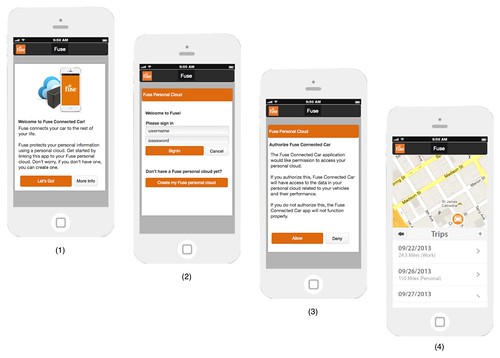Summary
Substitutability is a key feature of decentralized systems that give people real choice and build trust. The coming Internet of Things will be limited in what it can provide without it.
In a recent update on the Fuse Kickstarter project, I posted a picture showing a possible UI flow for linking the Fuse app to the back end service that provides Fuse with all it's smarts. If you've been following along, you'll know that I propose that the service act as a personal cloud and that the app be built using the Personal Cloud Application Architecture.
Here's the initial flow I proposed:

The interaction proceeds left to right. Screen (2) follows the user clicking "Let's Go!" on screen (1). Screen (3) follows the sign in on (2). Screen (4) (or something like it) follows the user clicking on "Allow" on (3) if there are vehicles in the personal cloud. If not, the flow would lead to an "Add car" flow. I'm not showing the "More info" page or the account creation page. The "More info" page would talk more about the Fuse personal cloud and our policies around personal data.
Screen (3) is a "consent screen" asking the user for consent to allow the app to link to their personal cloud. Adrian Gropper wrote back to me:
Hi Phil,
In general, I have a problem with the feel of consent screens like #3 because they don't offer a meaningful choice. They feel like a standard click-through agreement and, as such, do injustice to the personal cloud concept we're promoting.
I don't have a clear solution for this problem in the Fuse application. In general, I'd hope to see at least 3 choices:
- full functionality if I trust the service provider
- partial functionality if I share nothing with the service provider yet and may choose one later
- no functionality if I want to pause and investigate service provider options
In other words, meaningful choice means that the service providers are substitutable and compete for my trust and that this is made clear to me at the point of giving consent.
Adrian
Adrian's last graf has a vital point that anyone interested in the larger Internet of Things must pay attention to: "meaningful choice means that the service providers are substitutable and compete for my trust".
Substitutablity is a key feature of decentralized systems. I can change my ISP without loss of functionality. I can change Web hosting providers. I can change email providers. I can even provide all of those things myself if I like and have it all work the same. Many people have used the same email address for 20 years now, all the while using a variety of email providers.
Unfortunately, the world that Web 2.0 gave us is decidedly unsubstitutable. I can use Twitter, Facebook, or both, but they're not substitutable in the same way as email. I can't substitute my iPhone for a Nexus without finding new apps and learning new things. I can't substitute one API for another because there are no standards. If the future is social, mobile, and cloud, we've given up a lot to get there. I talk about this at length in Why Personal Clouds Needs an OS.
I fully intend for people to be able to link their Fuse app to an alternate system (that speaks the Fuse API). Until the time that such alternate systems exist, however, Adrian's comment is spot on. Right now, the consent screen will largely be a "agree or else" proposition and that doesn't feel right. But without the backend system there's no graceful fallback to partial functionality. Kind of a Catch-22. If you've got suggestions, I'm open to them.
We need personal clouds. They need to be interoperable. They need to be substitutable. Our personal data must be portable. As Adrian says above, that's the way we build a system that we can trust. Choice in email allows me to find an email provider I trust. Choice in ISPs (for those of us not in a Comcast wasteland) let's me find one I trust.
What happens if you stop trusting Facebook? Fortunately, for most of us, Facebook isn't something we have to have to do our jobs, so we could just stop using it. But what about when the Internet of Things is fully in play, you've got a thousand connected products in your life and you stop trusting the company that provides their cloud backend? Unless that infrastructure is substitutable, you're stuck. Privacy, functionality, and affordability are all at risk without substitutability.




